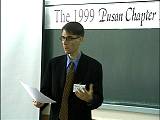![]()
Chat
Room
Classifieds
Exchange
Rates
The
Exit
Features
Food
Graffiti
Wall
Guestbook
Info
Center
Language
Guide
Links
Movie
Listings
News
Photo
Gallery
Places
Profiles
Pusan
Time
Pusan
Weather
Q
& A
What's
Going On
Writings

|
|
|
|
|
Samuel Collins
Dongseo University
|

|
| Click on the photo to see a full size image. To watch the video clip, click on the 'watch' icon. To download the video file to your hard drive, RIGHT CLICK on the 'download' icon and 'save link as'. For more information on how to watch and download video click here. You will need to have the Free Real Player installed in order to open the video files. You can download it for free here. |
|
ABSTRACT From the beginning of Korean modernity in the 1876 opening of the ports to the present, English has been part of the oftentimes hostile incursion of the outside onto the peaceful homogeneity of Korean life. At the same time, as Presidents Kim Young-sam and Kim Dae-jung have consistently reiterated, English is the key to Korean survival, recovery and prosperity. This is the double-edged sword of �globalization,� at once the promise of increased wealth through exports and the threat of �McDonaldization,� the purported loss of self and, importantly, indigenous language through the homogenizing force of Western business and culture. This paper examines the contradictory attitudes of Korean people and Korean media toward English, a language simultaneously global (the lingua franca of international commerce) and imperial (inextricably linked to the hegemony of the United States). From interviews and analyses of mass media, I suggest that the (not always coherent) Korean solution to the problem of English is to appropriate English, i.e., to exert, or attempt to exert, some control over the alien by rendering it simultaneously familiar and controllable. PRESENTER
BIOGRAPHY
|